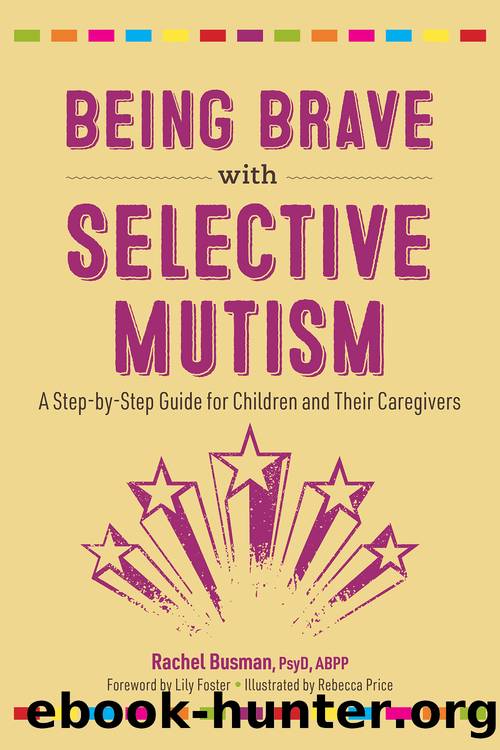Being Brave with Selective Mutism by Rachel Busman

Author:Rachel Busman [Busman, Rachel]
Language: eng
Format: epub
Publisher: Jessica Kingsley Publishers
Published: 2023-05-18T00:00:00+00:00
Letâs talk about a few of these situations and then come up with a plan for them. Then, you can use the plan to map out how to tackle the rest of the things on the list.
Answering questions from teachers
Teachers ask a lot of questions and that makes sense. Besides asking questions about what you are learning, they ask about all kinds of other things too. Itâs fair to say that being able to answer your teacher is something worth working on because teachers ask questions pretty much all the time. It may not be easy, but itâs a good goal to work on for a few reasons. One reason is that if you can answer a question from your teacher, then you are well on your way to more success in the classroom. You will be more able to participate in a variety of important activities once you are able to communicate verbally with your teacher(s).
This part of the plan requires that the teacher is aware that there is a plan in the first place. If you have a therapist or someone you work with at school like a social worker or psychologist, letting them help you would be a great idea. If you donât have one of those people, thatâs not a problemâyour caregiver can speak to the teacher and help them get on board with the plan. Once the teacher knows what your goal is, then they will be better able to help you achieve it.
We need to figure out where to start. Do you think that the first time your teacher asks you a question, it should be a hard one in front of the whole class? If you thought, âUm, no way!â I happen to agree with you. That would be too hard in my opinion. Why? Itâs too many things at once: itâs in front of everyone, itâs a hard question, and itâs the first time you are practicing.
I recommend having your caregiver reach out to your teacher and plan when to ask the question and what the question should be. That way, we are setting the stage for success by controlling as much as possible. For example, the teacher could ask you what you had for breakfast that morning, and you could practice that question with your caregiver before the teacher asks you. Thatâs the what. For the when it might be best if the teacher asked you a question when no one else is in the classroom or at least when you are not the center of attention. Itâs not impossible, but it takes a plan.
Download
This site does not store any files on its server. We only index and link to content provided by other sites. Please contact the content providers to delete copyright contents if any and email us, we'll remove relevant links or contents immediately.
Men In Love by Nancy Friday(5240)
Everything Happens for a Reason by Kate Bowler(4743)
The Immortal Life of Henrietta Lacks by Rebecca Skloot(4588)
Why We Sleep by Matthew Walker(4447)
The Sports Rules Book by Human Kinetics(4388)
Not a Diet Book by James Smith(3429)
The Emperor of All Maladies: A Biography of Cancer by Siddhartha Mukherjee(3163)
Sapiens and Homo Deus by Yuval Noah Harari(3071)
Day by Elie Wiesel(2785)
Angels in America by Tony Kushner(2662)
A Burst of Light by Audre Lorde(2607)
Endless Forms Most Beautiful by Sean B. Carroll(2483)
Hashimoto's Protocol by Izabella Wentz PharmD(2375)
Dirty Genes by Ben Lynch(2318)
Reservoir 13 by Jon McGregor(2304)
Wonder by R J Palacio(2211)
And the Band Played On by Randy Shilts(2210)
The Immune System Recovery Plan by Susan Blum(2058)
Stretching to Stay Young by Jessica Matthews(2045)
